英语动词的时态用法总结及答案
初中必备英语动词的时态技巧全解及练习题(含答案)
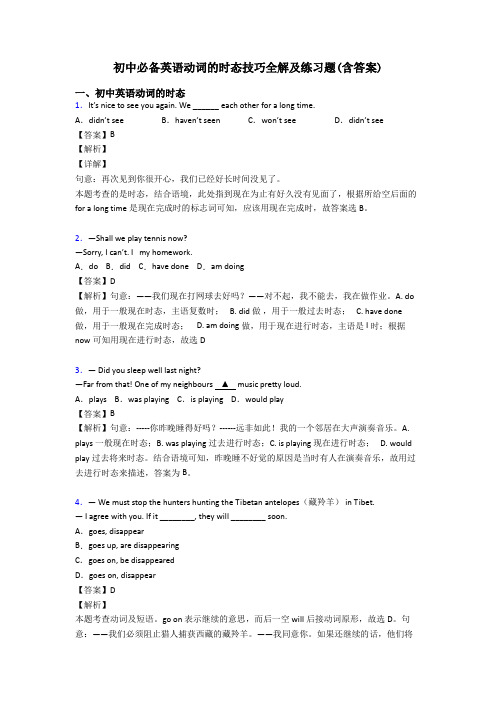
初中必备英语动词的时态技巧全解及练习题(含答案)一、初中英语动词的时态1.It’s nice to see you again. We ______ each other for a long time.A.didn’t see B.haven’t seen C.won’t see D.didn’t see【答案】B【解析】【详解】句意:再次见到你很开心,我们已经好长时间没见了。
本题考查的是时态,结合语境,此处指到现在为止有好久没有见面了,根据所给空后面的for a long time是现在完成时的标志词可知,应该用现在完成时,故答案选B。
2.—Shall we play tennis now?—Sorry, I can’t. I my homework.A.do B.did C.have done D.am doing【答案】D【解析】句意:——我们现在打网球去好吗?——对不起,我不能去,我在做作业。
A. do 做,用于一般现在时态,主语复数时; B. did做,用于一般过去时态; C. have done 做,用于一般现在完成时态; D. am doing做,用于现在进行时态,主语是I时;根据now可知用现在进行时态,故选D3.— Did you sleep well last night?—Far from that! One of my neighbours ▲ music pretty loud.A.plays B.was playing C.is playing D.would play【答案】B【解析】句意:-----你昨晚睡得好吗?------远非如此!我的一个邻居在大声演奏音乐。
A. plays一般现在时态;B. was playing 过去进行时态;C. is playing 现在进行时态; D. would play过去将来时态。
结合语境可知,昨晚睡不好觉的原因是当时有人在演奏音乐,故用过去进行时态来描述,答案为B。
英语动词时态总结

英语动词时态总结一、一般现在时(Simple Present Tense)表示经常性动作、惯性动作、普遍真理等。
1. 动词原形:- I, you, we, they + 动词原形- He, she, it + 动词原形 + -s/-es2. 特殊用法:- 表示客观事实或普遍真理:The sun rises in the east.- 表示经常性或惯性动作:I often go for a run in the morning.二、一般过去时(Simple Past Tense)表示过去某个时间发生的动作或存在的状态。
1. 动词过去式:- 一般情况下,动词过去式在词尾加-ed。
- 不规则动词过去式需单独记忆。
2. 特殊用法:- 表示过去的经历或事件:We traveled to France last summer.三、一般将来时(Simple Future Tense)表示将来发生的动作或存在的状态。
1. will/shall + 动词原形:- I, you, he, she, it, we, they + will + 动词原形- I, we + shall + 动词原形2. 特殊用法:- 表示决定、承诺、意愿等:I will help you with your homework.四、现在进行时(Present Continuous Tense)表示现在正在进行的动作。
1. be(am/is/are) + 动词-ing:- I + am + 动词-ing- He, she, it + is + 动词-ing- You, we, they + are + 动词-ing2. 特殊用法:- 表示现在进行的动作:I am studying for the exam.五、过去进行时(Past Continuous Tense)表示过去某个时间正在进行的动作。
1. was/were + 动词-ing:- I, he, she, it + was + 动词-ing- You, we, they + were + 动词-ing2. 特殊用法:- 表示过去正在进行的动作:She was watching TV when I arrived.六、将来进行时(Future Continuous Tense)表示将来某个时间正在进行的动作。
人教版英语英语动词的时态用法总结及解析

人教版英语英语动词的时态用法总结及解析一、初中英语动词的时态1.---Did you watch the program The Voice last night?---I wanted to, but my mother __________her favorite TV play.A.watches B.watched C.was watching D.is watching【答案】C【解析】句意:昨晚你看《The Voice》了吗?——我想看,但是我妈妈在看她最喜欢的电视剧。
下句是解释了当时为何没有观看《The Voice》的原因,是由于当时妈妈在看她最喜欢的电视剧。
在过去的某一时刻发生的动作用过去进行时态来表达,故答案为C。
2.-Has your cousin arrived in Beijing yet?--Yes. She Beijing since yesterday morning.A.arrived in B.has arrived in C.has been in D.has been to【答案】C【解析】句意:你表弟到北京了吗?-是的。
她从昨天起就在北京了。
since yesterday morning自昨天早晨以来,表示的是截止到目前为止的时间段,用于现在完成时态,排除A;arrived为短暂性动词,不能与表示一段的时间状语连用;have been to表示某人去过某地,也不能与表示一段的时间状语连用,故答案为C。
点睛:have(has) been in 表示“在某地呆多长时间”,常与表示一段时间的状语连用,如:since, for, how long 等。
例如:Mr. Brown has been in Shanghai for three days. 布朗先生来上海已经有三天了。
have(has)been to表示“曾经去过某地”,现在已经不在那里了。
可与just, ever, never等连用,例如: I have just been to the post office. 我刚才去邮局了。
动词八大时态用法以及练习总结精华
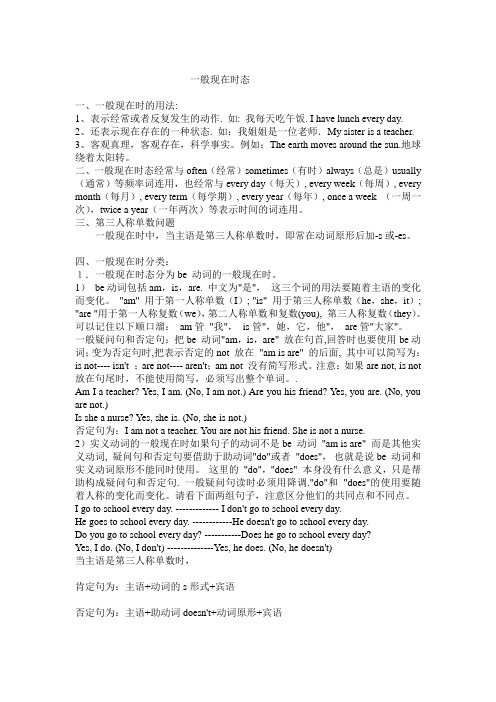
一般现在时态一、一般现在时的用法:1、表示经常或者反复发生的动作. 如: 我每天吃午饭. I have lunch every day.2、还表示现在存在的一种状态. 如:我姐姐是一位老师.My sister is a teacher.3、客观真理,客观存在,科学事实。
例如:The earth moves around the sun.地球绕着太阳转。
二、一般现在时态经常与often(经常)sometimes(有时)always(总是)usually (通常)等频率词连用,也经常与every day(每天), every week(每周), every month(每月), every term(每学期), every year(每年), once a week (一周一次),twice a year(一年两次)等表示时间的词连用。
三、第三人称单数问题一般现在时中,当主语是第三人称单数时,即常在动词原形后加-s或-es。
四、一般现在时分类:1.一般现在时态分为be 动词的一般现在时。
1)be动词包括am,is,are. 中文为"是",这三个词的用法要随着主语的变化而变化。
"am" 用于第一人称单数(I); "is" 用于第三人称单数(he,she,it); "are "用于第一人称复数(we),第二人称单数和复数(you), 第三人称复数(they)。
可以记住以下顺口溜:am管"我",is管",她,它,他",are管"大家"。
一般疑问句和否定句:把be 动词"am,is,are" 放在句首,回答时也要使用be动词;变为否定句时,把表示否定的not 放在"am is are" 的后面, 其中可以简写为:is not---- isn't ;are not---- aren't;am not 没有简写形式。
人教版英语英语动词的时态用法总结含答案

人教版英语英语动词的时态用法总结含答案一、初中英语动词的时态1.--Have you been to Suning Plaza(苏宁购物中心) in our city?--No. Although it for more than a week, I'm far too busy to go there.A.has started B.has been onC.has been open D.has opened【答案】C【解析】【详解】句意:——你曾经去过我们市的苏宁购物中心吗?——没有。
尽管它开业有一周多了,但是我太忙而没有时间去那里。
和一段时间连用,动作要用延续性的或者用延续性的状态词。
open,start都是瞬间动词。
be on表示工作着,开着,一般指电器,煤气或水龙头等;be open表示开着的,营业中的;这两个词都是延续性状态,结合句意,故选C。
2.Miss Smith in our school since five years ago.A.teaches B.taught C.has taught D.is teaching【答案】C【解析】句意:Smith小姐从5年前就已经在我们学校教书了。
考查现在完成时。
since five years ago自从五年前以来,意为自从五年前以来他就教我们英语,表示状态的持续,用于现在完成时;现在完成时的构成:主语+have/has+动词过去分词;主语是Miss Smith,所以助动词用has,teach教,实义动词,过去分词是taught,故答案选C。
3.By the time I ________ on the TV, Beckham ________ two goals.A.turned; have scored B.turned; had scoredC.had turned; have scored D.had turned; had scored【答案】B【解析】句意:当我打开电视的时候,贝克汉姆已经进了两个球。
小学英语语法时态归纳及练习(含答案解析)

英语时态归纳一、一般现在时:标志词:often(经常) sometimes(有时) always(总是) usually(通常) never(从不) every(每一)行为动词词型变化形式:一般现在时动词只有第三人称有词形变化;其他人称(第一人称:I, we;第二人称:you;第三人称复数:they、my friends)动词均用原形。
当主语是第三人称单数时,一般动词在一般现在时句子中的变化规律:1、多数在动词后加s:play—plays like—likes ,2、以s,x,sh,ch,o结尾的动词加es wash–washes catch–catches do–does3、以辅音字母加y结尾,把y改i再加es fly—flies study—studies4、以元音字母加y结尾,直接加s buy – buys5、不规则变化have—has一般现在时基本用法功能1.表示事物或人物的特征、状态。
如:The sky is blue.天空是蓝色的。
2.表示经常性或习惯性的动作。
如:I get up at six every day.我每天六点起床。
3.表示客观现实。
如:The earth goes around the sun.地球绕着太阳转。
The earth is round.构成1. be动词:主语+be(am,is,are)+其它。
如:I am a boy.我是一个男孩。
2.行为动词:主语+行为动词(+其它)。
如:We study English.我们学习英语。
句型肯定句:A.be动词:主语+ be + 其它成分He is a worker.B.行为动词:主语+动词(注意人称变化) +其它成分We like the little cat.否定句:A.be动词:主语+ be + not+其它成分They are not students.B.行为动词:主语+助动词(do/does) + not+动词原形+其它成分We don’t like the little cat.一般疑问句:A.be动词:Am / Is /Are +主语+ 其它成分Are you a teacher? Yes, I am. / No, I am not.Are they students of your school. Yes, they are / No they aren’t.B.行为动词:助动词(Do/Does)+主语+动词原形+ 其它成分Do you like it? Yes, I do. / No. I don’t .Does he(she) like it? Yes, he( she )does. / No, he ( she )doesn’t.特殊疑问句:疑问词+ 一般疑问句A.be动词:How many students are there in your school?B.行为动词:What do you usually do on Sunday?一般现在时动词be和have的变化形式1.动词Be 叫连系动词, 用法:第一人称单数用am,第三人称单数用is,其它人称用are。
(英语)初中英语动词的时态常见题型及答题技巧及练习题(含答案)
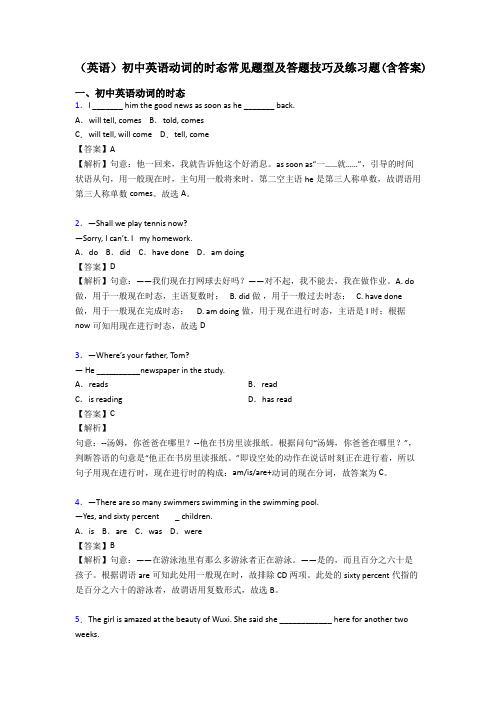
(英语)初中英语动词的时态常见题型及答题技巧及练习题(含答案)一、初中英语动词的时态1.I _______ him the good news as soon as he _______ back.A.will tell, comes B.told, comesC.will tell, will come D.tell, come【答案】A【解析】句意:他一回来,我就告诉他这个好消息。
as soon as“一……就……”,引导的时间状语从句,用一般现在时,主句用一般将来时。
第二空主语he是第三人称单数,故谓语用第三人称单数comes。
故选A。
2.—Shall we play tennis now?—Sorry, I can’t. I my homework.A.do B.did C.have done D.am doing【答案】D【解析】句意:——我们现在打网球去好吗?——对不起,我不能去,我在做作业。
A. do 做,用于一般现在时态,主语复数时; B. did做,用于一般过去时态; C. have done做,用于一般现在完成时态; D. am doing做,用于现在进行时态,主语是I时;根据now可知用现在进行时态,故选D3.—Where’s your father, Tom?— He __________newspaper in the study.A.reads B.readC.is reading D.has read【答案】C【解析】句意:--汤姆,你爸爸在哪里?--他在书房里读报纸。
根据问句“汤姆,你爸爸在哪里?”,判断答语的句意是“他正在书房里读报纸。
”即设空处的动作在说话时刻正在进行着,所以句子用现在进行时,现在进行时的构成:am/is/are+动词的现在分词,故答案为C。
4.—There are so many swimmers swimming in the swimming pool.—Yes, and sixty percent _ children.A.is B.are C.was D.were【答案】B【解析】句意:——在游泳池里有那么多游泳者正在游泳。
英语动词的时态常见题型及答题技巧及练习题(含答案)及解析
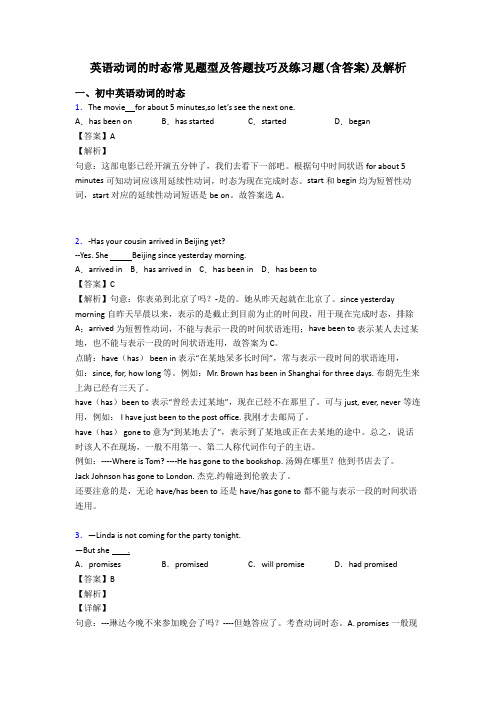
A.leftB.leave
C.will leaveD.has left
【答案】C
【解析】
【详解】
句意:火车一小时后出发。我现在必须去火车站。A. left一般过去时;B. leave一般现在时;C. will leave一般将来时;D. has left现在完成时。in an hour一个小时后,表示的是将来的时间,因此句子的时态用一般将来时,其构成为will+动词原形,故答案为C。
have(has)gone to意为“到某地去了”,表示到了某地或正在去某地的途中。总之,说话时该人不在现场,一般不用第一、第二人称代词作句子的主语。
例如:----Where is Tom? ----He has gone to the bookshop.汤姆在哪里?他到书店去了。
Jack Johnson has gone to London.杰克.约翰逊到伦敦去了。
8.—Why didn't you open the door for me just now?
—Sorry,Ia bath.
A.will take B.am taking C.was taking D.take
【答案】C
【解析】
【详解】
句意:--刚才你为什么不给我开门?--对不起,我在洗澡。根据didn't you open the door这里叙述的是过去的事情,根据句意可知该开门的时间正在洗澡,也就是说过去某个时间正在进行的动作,应该用过去进行时。过去进行时的谓语动词的形式是:was/were+doing,故选C。
英语时态总结及习题(最全)

五、现在完成时1.概念:过去发生或已经完成的动作对现在造成的影响或结果,或从过去已经开始,持续到现在的动作或状态。
2.时间状语:yet,already,just,never,ever,so far,by now,since+时间点,for+时间段,recently, lately, in the past few years, etc.3.基本结构:主语+have/has +p.p(过去分词)+其他4.否定形式:主语+have/has + not +p.p(过去分词)+其他5.一般疑问句:have或has。
6.例句:I've written an article.The countryside has changed a lot in the past few years.基础练习一、选择填空1.—Have you got any pieces of paper?—Yes, I _____ .A. have gotB. haveC. had oneD. did2.Have you ever _____ to a foreigner?A. speakB. spokeC. spokenD. to speak3.Let’s forget _____ thing.A. the allB. all theC. whole theD. the whole4.Can you find the answer _____ the question?A. toB. ofC. inD. at5.She’s never read the book before, _____ ?A. has sheB. hasn’t sheC. isn’t sheD. wasn’t she?二、用所给动词的适当形式填空1.I ____ just ____ (finish) my homework.2.He ____ (go) to school on foot every day.3. ____ you ____ (find) your science book yet?4.If it ____ (be) fine tomorrow, I’ll go with you.5.She doesn’t like the childr en ____ (play) in the room.6.The students ____ (read) English when the teacher came in.7.Look! The monkey ____ (climb) the tree.8.My mother ____ (come) to see me next Sunday.9.How many sheep ____ you ____ (get)? Only one.10.I’ve lost my pen. ____ you ____ (see) it anywhere?强化练习一、单项选择。
初中英语语法八大时态总结(附答案)
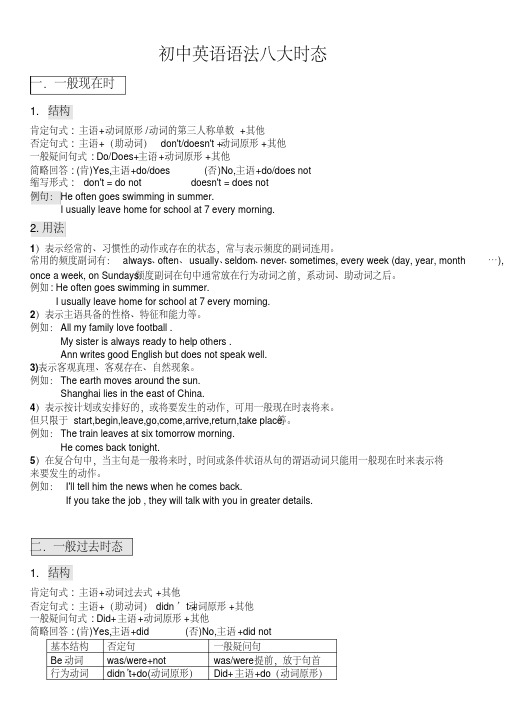
初中英语语法八大时态一.一般现在时1.结构肯定句式: 主语+动词原形/动词的第三人称单数+其他否定句式: 主语+(助动词)don't/doesn't +动词原形+其他一般疑问句式: Do/Does+主语+动词原形+其他简略回答: (肯)Yes,主语+do/does (否)No,主语+do/does not缩写形式: don't = do not doesn't = does not例句:He often goes swimming in summer.I usually leave home for school at 7 every morning.2.用法1)表示经常的、习惯性的动作或存在的状态,常与表示频度的副词连用。
常用的频度副词有:always、often、usually、seldom、never、sometimes, every week (day, year, month…), once a week, on Sundays.频度副词在句中通常放在行为动词之前,系动词、助动词之后。
例如: He often goes swimming in summer.I usually leave home for school at 7 every morning.2)表示主语具备的性格、特征和能力等。
例如:All my family love football .My sister is always ready to help others .Ann writes good English but does not speak well.3)表示客观真理、客观存在、自然现象。
例如:The earth moves around the sun.Shanghai lies in the east of China.4)表示按计划或安排好的,或将要发生的动作,可用一般现在时表将来。
最新英语动词的时态常见题型及答题技巧及练习题(含答案)

最新英语动词的时态常见题型及答题技巧及练习题(含答案)一、初中英语动词的时态1.―Eric, can you bring me the scissors? ―Just a moment. I the paper-cutting with it. A.make B.madeC.am making D.has made【答案】C【解析】句意:——Eric,你能给我带来剪刀吗?——等一会儿。
我正在用它做剪纸。
根据Justa moment可知此处表示让对方等一会儿,应是正在使用这个剪刀,故用现在进行时be doing,故选C。
2.—My grandma looking at that photo on the wall.—I can understand. It helps her remember her childhood.A.enjoys B.enjoyedC.was enjoying D.will enjoy【答案】A【解析】句意:——我奶奶喜欢看墙上的那个照片。
——我能理解,它能帮她想起她的童年。
A. enjoys喜欢,用于一般现在时态,主语单三时; B. enjoyed 喜欢,用于一般过去时态;C. was enjoying 喜欢,用于过去进行时态,主语单三时;D. will enjoy喜欢,用于一般将来时态;根据It helps her remember her childhood.可知用一般现在时态;故选A3.We a few museums while we were in London.A.visit B.visitedC.have visited D.are visiting【答案】B【解析】句意:当我在伦敦时,我参观了几个博物馆。
A. visit 参观,用于一般现在时态,主语复数时; B. visited 参观,用于一般过去时态; C. have visited 参观,用于一般现在完成时态;D. are visiting 参观,用于现在进行时态,主语复数时;根据 while we were in London.可知主句用过去时态;故选B4.—May I speak to Mary?—Hold on, please.She_______in the kitchen.A.has cooked B.cooked C.will cook D.is cooking【答案】D【解析】句意:——我可以让玛丽接电话吗?——请不要挂断电话。
(英语)英语动词的时态常见题型及答题技巧及练习题(含答案)及解析
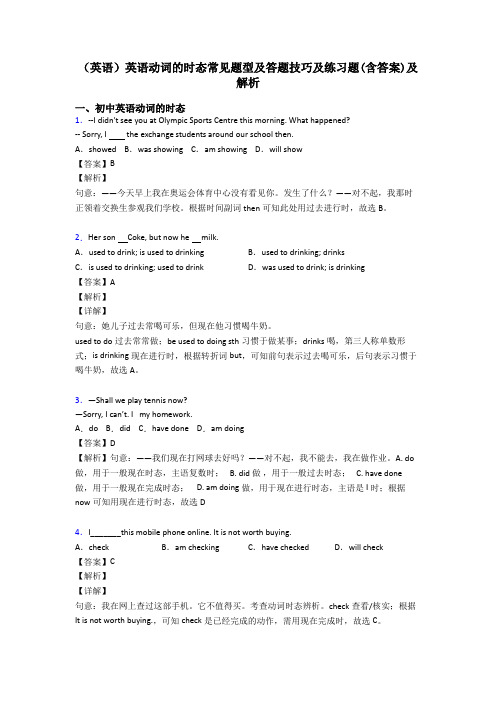
(英语)英语动词的时态常见题型及答题技巧及练习题(含答案)及解析一、初中英语动词的时态1.--I didn't see you at Olympic Sports Centre this morning. What happened?-- Sorry, I the exchange students around our school then.A.showed B.was showing C.am showing D.will show【答案】B【解析】句意:——今天早上我在奥运会体育中心没有看见你。
发生了什么?——对不起,我那时正领着交换生参观我们学校。
根据时间副词then可知此处用过去进行时,故选B。
2.Her son Coke, but now he milk.A.used to drink; is used to drinking B.used to drinking; drinksC.is used to drinking; used to drink D.was used to drink; is drinking【答案】A【解析】【详解】句意:她儿子过去常喝可乐,但现在他习惯喝牛奶。
used to do过去常常做;be used to doing sth习惯于做某事;drinks喝,第三人称单数形式;is drinking现在进行时,根据转折词but,可知前句表示过去喝可乐,后句表示习惯于喝牛奶,故选A。
3.—Shall we play tennis now?—Sorry, I can’t. I my homework.A.do B.did C.have done D.am doing【答案】D【解析】句意:——我们现在打网球去好吗?——对不起,我不能去,我在做作业。
A. do 做,用于一般现在时态,主语复数时; B. did做,用于一般过去时态; C. have done 做,用于一般现在完成时态; D. am doing做,用于现在进行时态,主语是I时;根据now可知用现在进行时态,故选D4.I_______this mobile phone online. It is not worth buying.A.check B.am checking C.have checked D.will check【答案】C【解析】【详解】句意:我在网上查过这部手机。
(完整版)16种英语时态总结归纳
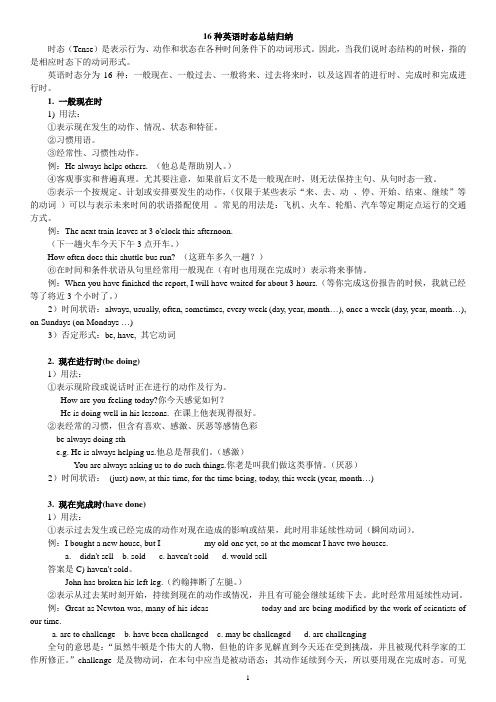
16种英语时态总结归纳时态(Tense)是表示行为、动作和状态在各种时间条件下的动词形式。
因此,当我们说时态结构的时候,指的是相应时态下的动词形式。
英语时态分为16种:一般现在、一般过去、一般将来、过去将来时,以及这四者的进行时、完成时和完成进行时。
1. 一般现在时1) 用法:①表示现在发生的动作、情况、状态和特征。
②习惯用语。
③经常性、习惯性动作。
例:He always helps others. (他总是帮助别人。
)④客观事实和普遍真理。
尤其要注意,如果前后文不是一般现在时,则无法保持主句、从句时态一致。
⑤表示一个按规定、计划或安排要发生的动作,(仅限于某些表示“来、去、动、停、开始、结束、继续”等的动词)可以与表示未来时间的状语搭配使用。
常见的用法是:飞机、火车、轮船、汽车等定期定点运行的交通方式。
例:The next train leaves at 3 o'clock this afternoon.(下一趟火车今天下午3点开车。
)How often does this shuttle bus run? (这班车多久一趟?)⑥在时间和条件状语从句里经常用一般现在(有时也用现在完成时)表示将来事情。
例:When you have finished the report, I will have waited for about 3 hours.(等你完成这份报告的时候,我就已经等了将近3个小时了。
)2)时间状语:always, usually, often, sometimes, every week (day, year, month…), once a week (day, year, month…), on Sundays (on Mondays …)3)否定形式:be, have, 其它动词2. 现在进行时(be doing)1)用法:①表示现阶段或说话时正在进行的动作及行为。
英语动词的时态含答案
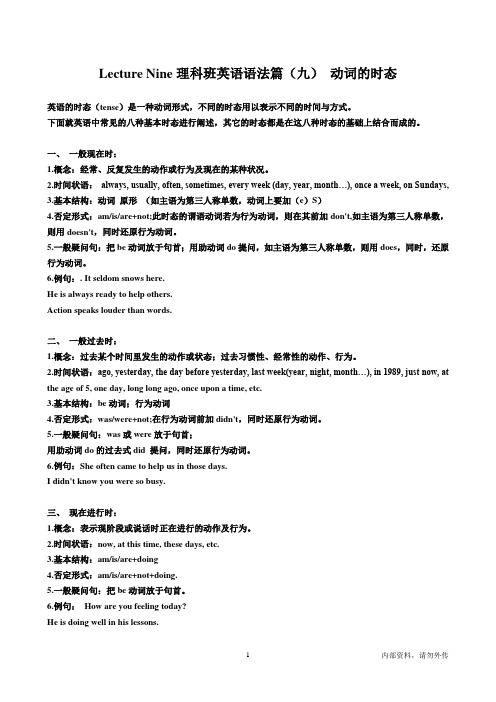
Lecture Nine理科班英语语法篇(九)动词的时态英语的时态(tense)是一种动词形式,不同的时态用以表示不同的时间与方式。
下面就英语中常见的八种基本时态进行阐述,其它的时态都是在这八种时态的基础上结合而成的。
一、一般现在时:1.概念:经常、反复发生的动作或行为及现在的某种状况。
2.时间状语:always, usually, often, sometimes, every week (day, year, month…), once a week, on Sundays,3.基本结构:动词原形(如主语为第三人称单数,动词上要加(e)S)4.否定形式:am/is/are+not;此时态的谓语动词若为行为动词,则在其前加don't,如主语为第三人称单数,则用doesn't,同时还原行为动词。
5.一般疑问句:把be动词放于句首;用助动词do提问,如主语为第三人称单数,则用does,同时,还原行为动词。
6.例句:. It seldom snows here.He is always ready to help others.Action speaks louder than words.二、一般过去时:1.概念:过去某个时间里发生的动作或状态;过去习惯性、经常性的动作、行为。
2.时间状语:ago, yesterday, the day before yesterday, last week(year, night, month…), in 1989, just now, at the age of 5, one day, long long ago, once upon a time, etc.3.基本结构:be动词;行为动词4.否定形式:was/were+not;在行为动词前加didn't,同时还原行为动词。
5.一般疑问句:was或were放于句首;用助动词do的过去式did 提问,同时还原行为动词。
初中九年级英语常用语法知识——动词时态知识点总结(含答案)

一、选择题1.Lily and Lucy _______ their mother. They have big eyes and yellow hair.A.like both B.both are like C.both like D.are both like D解析:D【解析】【分析】【详解】句意:莉莉和露西都像他们的母亲。
他们有大眼睛和黄头发。
be like表示像……,both副词,两者都,放在be动词,助动词,情态动词之后,实意动词之前。
like动词,喜欢,根据题意,排除AC;both放在动词are之后,排除B。
根据题意,故选D。
2.Colours can change our moods and make us happy or sad .A.feel B.to feelC.felt D.feeling A解析:A【解析】【分析】考查:非谓语动词【详解】句意:色彩可以改变我们的心情,让我们感到快乐或悲伤,充满活力或疲倦。
短语make sb. do sth. 使/让某人做某事;用省略to的不定式做宾补;故选A。
3.These chicken wings taste ________. I want more.A.well B.wonderfully C.nice D.bad C解析:C【解析】【详解】句意:这些鸡翅尝起来不错。
我想要更多。
考查感官动词的用法及形容词辨析。
well好,副词;wonderfully精彩地;nice好的;bad 坏的。
taste是感官系动词,其后接形容词作表语,排除AB;根据题干中“I want more.”可知鸡翅尝起来很好,排除D。
故选C。
4.The woman made her husband_______ outside the gate yesterday afternoon.A.wait B.waiting C.to wait D.waited A解析:A【解析】【详解】句意:昨天下午那个女人让她的丈夫在门外等待。
(英语) 中考英语动词的时态专题训练答案及解析

(英语)中考英语动词的时态专题训练答案及解析一、初中英语动词的时态1.— The boy misses his parents very much.— So he does. They _________ the hometown for nearly two years.A.have left B.has left C.have been away from D.will leave【答案】C【解析】【详解】句意:——那个男孩非常想念他的父母。
——他的确是。
他们离开家乡几乎两年了。
leave 离开,是短暂性动词,不与时间段连用;be away离开,与时间段连用。
此处接时间段for nearly two years连用,故用延续性动词,故选C。
2.—May I speak to Mary?—Hold on, please.She_______in the kitchen.A.has cooked B.cooked C.will cook D.is cooking【答案】D【解析】句意:——我可以让玛丽接电话吗?——请不要挂断电话。
她正在厨房做饭。
根据Hold on, please.可知此处表示现在让对方别挂断电话,应是表示他找的玛丽正做某事,故用现在进行时be doing,故选D。
3.–What’s your father doing now? –He ______ the room.A.cleaned B.cleans C.has cleaned D.is cleaning【答案】D【解析】【详解】句意:——你父亲现在在干什么?——他在打扫房间考查动词时态。
cleaned一般过去时;cleans一般现在时;has cleaned现在完成时;is cleaning现在进行时。
根据问句可知此句时态是现在进行时;故选D。
4.My grandparents in that city since they got married.A.will live B.have lived C.live D.were living【答案】B【解析】句意:自从结婚以来,我祖父母就住在那个城市。
英语动词的时态练习及答案详解 含答案解析

英语动词的时态练习及答案详解含答案解析一、初中英语动词的时态1.—Mum, where is my dictionary?—Oh, I didn’t see it, either. I’m afraid you ___________ it.A.are losing B.will lose C.have lost D.were losing【答案】C【解析】句意:——妈妈,我的字典在哪里?——哦,我也没有看到它,恐怕你把它弄丢了。
A. are losing现在进行时态; B. will lose一般将来时态;C. have lost现在完成时态; D. were losing 过去进行时态。
lose这一动词发生在过去,造成的结果是现在看不见了,属于完成的动作,要用现在完成时态来表达,故答案为C。
2.--- Where’s my father? Could tell me?--- He to Beijing. He’ll attend an important meeting.A.goes B.is going C.has gone D.has been【答案】C【解析】【详解】句意:——我的父亲在哪里?可以告诉我吗?——他已经去北京了。
他将参加一个重要会议。
考查动词时态辨析。
根据句意语境,可知父亲不在说话的地点已经去了北京,需用现在完成时,可排除AC两项。
have been to意为“曾经去过某地”,现在已不在那里了;have gone to意为“到某地去了”,说话时作句子主语的人不在现场,故选C。
3.When it began to rain heavily, she ________ for a bus at the bus stop.A.waited B.waits C.is waiting D.was waiting【答案】D【解析】句意:当雨下得很大时,她正在公共汽车站等公共汽车。
A. waited一般过去时;B. waits一般现在时;C. is waiting现在进行时;D. was waiting过去进行时。
(英语)英语动词的时态专题训练答案及解析
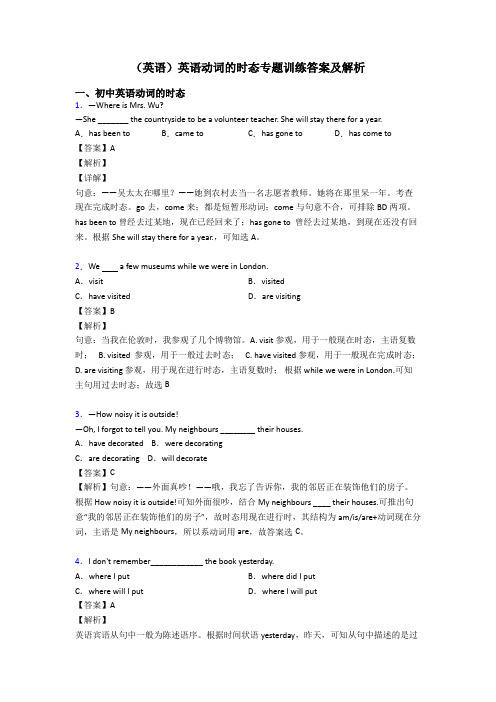
(英语)英语动词的时态专题训练答案及解析一、初中英语动词的时态1.—Where is Mrs. Wu?—She _______ the countryside to be a volunteer teacher. She will stay there for a year.A.has been to B.came to C.has gone to D.has come to【答案】A【解析】【详解】句意:——吴太太在哪里?——她到农村去当一名志愿者教师。
她将在那里呆一年。
考查现在完成时态。
go去,come来;都是短暂形动词;come与句意不合,可排除BD两项。
has been to 曾经去过某地,现在已经回来了;has gone to 曾经去过某地,到现在还没有回来。
根据She will stay there for a year.,可知选A。
2.We a few museums while we were in London.A.visit B.visitedC.have visited D.are visiting【答案】B【解析】句意:当我在伦敦时,我参观了几个博物馆。
A. visit 参观,用于一般现在时态,主语复数时; B. visited 参观,用于一般过去时态; C. have visited 参观,用于一般现在完成时态;D. are visiting 参观,用于现在进行时态,主语复数时;根据 while we were in London.可知主句用过去时态;故选B3.—How noisy it is outside!—Oh, I forgot to tell you. My neighbours ________ their houses.A.have decorated B.were decoratingC.are decorating D.will decorate【答案】C【解析】句意:——外面真吵!——哦,我忘了告诉你,我的邻居正在装饰他们的房子。
人教版英语初二英语英语动词的时态知识点总结附答案

人教版英语初二英语英语动词的时态知识点总结附答案一、初中英语动词的时态1.- Mr. Black will go to Shanghai in a few days. Do you know when the earliest plane _____on Sunday?- At 10:00am.A.leaves off B.took off C.is leaving off D.is taking off【答案】D【解析】句意:——布莱克先生几天后将去上海。
你知道星期日最早的飞机什么时候起飞吗?——上午10点。
考查动词短语和时态辨析题。
leave off停止,中断(做某事);take off (飞机)起飞,都是固定短语,可知后者符合句意,可排除AC两项。
问句是时间状语从句,主句do是一般现在时,可知过去式took错误,结合答语At 10:00am.是将来的时间,故选D。
2.--- Where’s my father? Could tell me?--- He to Beijing. He’ll attend an important meeting.A.goes B.is going C.has gone D.has been【答案】C【解析】【详解】句意:——我的父亲在哪里?可以告诉我吗?——他已经去北京了。
他将参加一个重要会议。
考查动词时态辨析。
根据句意语境,可知父亲不在说话的地点已经去了北京,需用现在完成时,可排除AC两项。
have been to意为“曾经去过某地”,现在已不在那里了;have gone to意为“到某地去了”,说话时作句子主语的人不在现场,故选C。
3.---Where is Mr. Wang?---He together with his students _______ Haibin Park.A.have gone to B.has gone to C.has been to D.have been to【答案】B【解析】【详解】句意“-王先生去哪里了?-他和他的学生去了海滨公园”。
- 1、下载文档前请自行甄别文档内容的完整性,平台不提供额外的编辑、内容补充、找答案等附加服务。
- 2、"仅部分预览"的文档,不可在线预览部分如存在完整性等问题,可反馈申请退款(可完整预览的文档不适用该条件!)。
- 3、如文档侵犯您的权益,请联系客服反馈,我们会尽快为您处理(人工客服工作时间:9:00-18:30)。
英语动词的时态用法总结及答案一、初中英语动词的时态1.--Where is Grace?--She with her brother playing basketball at school.A.is practice B.is practicing C.are practicing D.are practice【答案】B【解析】句意:——格雷斯在哪里?——她正在和她哥哥在学校练习打篮球。
be后跟现在分词,构成现在进行时态,此句的主语为she,with her brother做状语,be用is,故答案为B。
点睛:主语为单数名词或代词,尽管后面跟有with,together with,along with,as well as,besides,except,but,like等介词或介词短语时,谓语动词用单数形式。
例如:Mike with his father has been to England. 迈克同他的父亲去过英格兰。
Mike, like his brother, enjoys playing football. 迈克像他的哥哥一样喜欢踢足球。
2.--- I went to see you last night, but you weren’t in. Where were you then?---I _______ a walk by the river.A.had B.was having C.have had D.have【答案】B【解析】【详解】句意:——昨晚我去看你了,但你不在。
那时你在哪里?——我在河边散步。
由上文中“Where were you then?”可知,问句是询问“昨天晚上当我去看望你的时候,你正在哪里?”此句表达的是过去正在发生的事情,要用过去进行时态。
故答案为B。
3.They don’t live here any longer. They to Chengdu last month.A.move B.moved C.will move D.are moving【答案】B【解析】【详解】句意:他们不再住在这里了,他们上个月搬到了成都。
考查一般过去时。
A. move一般现在时;B. moved一般过去时;C. will move一般将来时;D. are moving现在进行时。
根据They don’t live here any longer.可知此处句意为“他们上个月搬到了成都。
”由last month可知时态用一般过去时;故答案选B。
4.-Have you washed the clothes? -Not yet. But I _________ them in half an hour. A.washed B.have washed C.will wash D.wash【答案】C【解析】句意:——你洗衣服了吗?——还没有。
但我半小时以后就洗。
In half an hour半小时后,表示的是将来时间。
故选C。
5.If our government pay attention to the safety of food, our health in danger. A.isn’t; is B.doesn’t; will beC.won’t; is D.isn’t; will be【答案】B【解析】【详解】句意:如果我们的政府现在不注意食品安全,我们的健康就会出于危险之中。
结合语境可知,本句主语描述的是将来某时进行的动作,故用一般将来时态。
当主句描述将来时态,if引导的条件状语从句中用一般现在时态表示将来动作,结合语境可知选B。
6.My grandma dinner when I got home yesterday.A.cooks B.was cooking C.is cooking D.will cook【答案】B【解析】【详解】句意:昨天当我到家的时候,我的祖母正在做晚饭。
根据when I got home yesterday.可知,这里指的是昨天到家时,另一个动作正在发生,表示过去某个时刻正在进行的动作,应该用过去进行时。
其谓语动词的形式是:was/were doing,故选B。
7.Peter and Linda Beijing for Shanghai yesterday afternoon.A.leave B.left C.are leaving D.will leave【答案】B【解析】【详解】句意:昨天下午Peter和 Linda离开北京去上海了。
短语leave +某地+for+某地“离开某地去某地”根据yesterday afternoon可知,句子应该用一般过去时,故选B。
8.— What are you doing now, Kate?— I an email to my friend.A.write B.am writing C.wrote D.have written【答案】B【解析】句意:——凯特你在做什么?——我正在给我的朋友写电子邮件。
考查现在进行时。
根据What are you doing now, Kate?可知是问正在做什么,现在进行时态,所以回答也应用现在进行时,其构成为be+动词现在分词;主语是I,所以系动词be用am,write的现在分词是writing,故答案选B。
9.—Mum, where is my dictionary?—Oh, I didn’t see it, either. I’m afraid you ___________ it.A.are losing B.will lose C.have lost D.were losing【答案】C【解析】句意:——妈妈,我的字典在哪里?——哦,我也没有看到它,恐怕你把它弄丢了。
A. are losing现在进行时态; B. will lose一般将来时态;C. have lost现在完成时态; D. were losing 过去进行时态。
lose这一动词发生在过去,造成的结果是现在看不见了,属于完成的动作,要用现在完成时态来表达,故答案为C。
10.— Do you know _____ a wonderful match and two basketball matches on July 15 th ?— Yeah . I am going to watch them on that day.A.there will be B.there is going to have C.there are going to be D.is there going to be【答案】A【解析】【详解】句意:——你知道7月15日会有一场精彩的比赛和两场篮球赛吗?——是的。
那天我要去看它们。
考查there be结构。
宾语从句需用陈述句语序,D是疑问句语序,可排除。
根据句意语境,本句用一般将来时。
there be 结构的一般将来时用there will be 和there is going to be,表示最近要做的事,可排除B。
根据就近原则,a wonderful match一场精彩的比赛,需用there is going to be,可排除C项。
综合以上,可知选A。
11.— Could you tell me ________? I must find him.— Sorry. I have no idea. But he was here just now.A.where Tom was B.where Tom has goneC.where can I find Tom D.where Tom has been【答案】B【解析】【详解】句意:——你能告诉我汤姆去哪儿了吗?我必须找到他。
——对不起,我不知道。
但他刚才在这里。
本题主要考查宾语从句。
根据语境,你能告诉“我”汤姆在哪里吗。
where 引导的宾语从句在句中作 tell 的直接宾语,me 为间接宾语。
宾语从句使用陈述语序,故此处应用“where + 主语 + 谓语”的结构,主语为 Tom,谓语为 be 动词。
故排除C项。
根据语境时态和主句时态保持一致Could you tell me表示请求允许后用现在完成时,has gone是指去某地,没回来;has been指从某地回来了。
结合语境可知,是指Tom去了某地。
故选B。
12.— I think the plan is just a waste of time. What do you think?—Well, if you don’t support the plan, ________.A.neither do I B.so do I C.neither will I D.so will I【答案】C【解析】句意:——我认为这个计划只是在浪费时间。
您是怎么想的?——好,如果你不支持这个计划,我也不支持。
Neither+助动词+主语,表示主语也不是……;这里是if引导的条件状语从句,主句用一般将来时,从句用一般现在时态,这里是主句,故助动词用will。
根据题意,故选C。
点睛:Neither+助动词+主语,表示主语也不是这样;so+助动词+主语,表示主语也是这样。
13.--Today’s young people can’t live without smart phones.--Their eyes are glued to the screen wherever they go, even while they_____ meals.A.have B.are having C.were having D.will have【答案】B【解析】【详解】句意:——今天的年轻人离不开智能手机。
——无论走到哪里,他们的眼睛都盯着屏幕,即使是在吃饭的时候。
考查现在进行时。
while引导时间状语从句时,强调主句和从句的动作同时发生,从句中常用进行时态;根据Their eyes are glued to the screen wherever they go, even while可知从句强调的动作是现在进行时态,即“他们在吃饭的时候,同时也在玩手机”;现在进行时的构成为:主语+be动词(am/is/are)+动词现在分词;本句主语是they,所以be动词用are,have meals吃饭,have的现在分词是having;故答案选B。
14.We will go to Tian’anmen Square to watch the raising of national flag if it _________ tomorrow.A.will rain B.rainsC.doesn’t rain D.won’t rain【答案】C【解析】试题分析:句意:如果明天不下雨我们要去天安门广场看升国旗。
